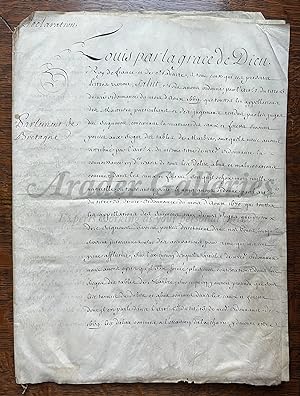document signed de louis xiv king france (2 résultats)
CommentairesFiltres de recherche
Type d'article
- Tous les types de produits
- Livres (1)
- Magazines & Périodiques (Aucun autre résultat ne correspond à ces critères)
- Bandes dessinées (Aucun autre résultat ne correspond à ces critères)
- Partitions de musique (Aucun autre résultat ne correspond à ces critères)
- Art, Affiches et Gravures (Aucun autre résultat ne correspond à ces critères)
- Photographies (Aucun autre résultat ne correspond à ces critères)
- Cartes (Aucun autre résultat ne correspond à ces critères)
- Manuscrits & Papiers anciens (1)
Etat En savoir plus
- Neuf (Aucun autre résultat ne correspond à ces critères)
- Comme neuf, Très bon ou Bon (Aucun autre résultat ne correspond à ces critères)
- Assez bon ou satisfaisant (1)
- Moyen ou mauvais (Aucun autre résultat ne correspond à ces critères)
- Conformément à la description (1)
Reliure
- Toutes
- Couverture rigide (Aucun autre résultat ne correspond à ces critères)
- Couverture souple (Aucun autre résultat ne correspond à ces critères)
Particularités
- Ed. originale (1)
- Signé (2)
- Jaquette (Aucun autre résultat ne correspond à ces critères)
- Avec images (2)
- Sans impressions à la demande (2)
Langue (1)
Prix
- Tous les prix
- Moins de EUR 20 (Aucun autre résultat ne correspond à ces critères)
- EUR 20 à EUR 45 (Aucun autre résultat ne correspond à ces critères)
- Plus de EUR 45
Livraison gratuite
- Livraison gratuite à destination de France (Aucun autre résultat ne correspond à ces critères)
Pays
Evaluation du vendeur
-
MANUSCRIPT DOCUMENT, in French, headed 'By the King' and signed 'Louis', authorising an exchange of prisoners of war
Edité par N, Versailles, 1711
Vendeur : Kay Craddock - Antiquarian Bookseller, Melbourne, VIC, Australie
Signé
EUR 2 590,54
Autre deviseEUR 19,86 expédition depuis Australie vers FranceQuantité disponible : 1 disponible(s)
Ajouter au panierFolio sheet, 37 cm. x 24 cm., edges a trifle chipped and split, slightly soiled, and with three horizontal creases from folding; float mounted on brown card, glazed and framed; Versailles, 28th September 1711. *The document is the authority to free an unidentified prisoner [d'Erback, Lieutenant General?] in exchange for the Marquis d'Alegre. Yves d'Alegre (1653-1733) was a distinguished French soldier who fought in all Louis XIV's wars: the Dutch War, the Nine Years' War, and the War of the Spanish Succession. He was captured and imprisoned a couple of times and eventually exchanged in 1712. He was a Knight of Malta, appointed Governor of Metz in 1723, and Marshal of France in 1724. In 1728 Louis XV appointed him a Chevalier of the Order du Saint-Esprit.
-
Document signed
Date d'édition : 1711
Vendeur : Arader Books, New York, NY, Etats-Unis
Manuscrit / Papier ancien Edition originale Signé
EUR 2 614,13
Autre deviseEUR 30,21 expédition depuis Etats-Unis vers FranceQuantité disponible : 1 disponible(s)
Ajouter au panierNo binding. Etat : Very good. First. Fontainebleau: 13 September 1711. Two vellum folios sewn (irregular: 13 1/4" x 9 15/16", 337mm x 253mm), written on two leaves, the final two leaves blank. Secretary hand, signed "Louis" and countersigned "Par Le Roy" "Colbert" on the verso of the second leaf. Twenty-one lines to each of the first two pages, twenty to the third, six to the fourth above the signatures. A transverse fold and two vertical folds, creating eight compartments (quite faint to the two written leaves). Loss to the upper spine-corner, partially affecting one letter (the "D" of "Declaration"). Some tanning (perhaps damp) to the lower quarter-inch of the first two leaves and to the loss at the upper spine-corner. A blemish to the verso of the final leaf, offsetting through the third and very faintly to the recto of the second. Louis XIV (1638-1715, r. 1643-1715) is the longest-reigning monarch in history; his seventy-two years on the throne are a golden age of French history, military achievement and cultural production. Ten years after his coming of age in 1651 (his mother, Anne of Austria, was regent from the death of Louis XIII in 1643), Louis broke convention by serving as his own prime minister (the true meaning of "absolute monarchy." This had significant consequences on the movement of documents through his government; whereas before ministers were empowered with certain rights of review, Louis declined to devolve that power: "vous, mes secretaires d'État, je vous ordonne de rien signer, pas même une sauvegarde ni un passe-port" (you, my Secretaries of State, I order you to sign nothing, not even a safeguard nor a passport." The present document is a declaration (that is, the proclamation or clarification of a law made by the king) to the Parlement de Bretagne (parlements were provincial appellate courts), made at Fontainebleau 13 September 1711 (p. 4, ll. 4-6). In February of 1704 a separate division of the Bretagne Parlement was created called a table de marbre, a reference to the marble table at the Palais de Justice in Paris at which decisions relating to "eaux et forêts" (i.e., forestry, hunting and fishing) were made. This declaration emphasized the jurisdiction of those at the "sieges des tables de Marbre" (p. 1, l. 7) over misdemeanors and crimes to do with either claims of land or committed while hunting. The declaration is particularly interesting as it applied principally to aristocrats, who were doubtless disinclined to accept civil judgments rather than rebukes made at the court of the king himself. The declaration is additionally countersigned by Jean-Baptist Colbert ("le Grand Colbert," 1619-1683) as principal minister of state (some sources report that it was countersigned by Phélypeaux). Purchased at Bonham's 22 June 2011.



